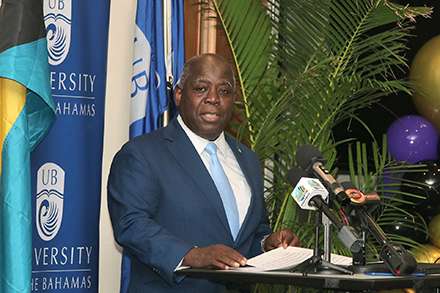Prime Minister Davis Urges Technological Innovation and Youth Engagement at the Bahamas Law Society’s Legal Week 2025
Prime Minister Philip Davis’ address at the University of The Bahamas Law Society’s Legal Week 2025 underscored the critical intersection of law, technology, and societal change. He emphasized the “triple transition” of climate change, digitalization, and social justice as forces reshaping the global landscape, demanding a legal system capable of adapting to this rapid evolution. He highlighted the imperative for Caribbean nations to invest significantly in technological innovation to navigate this transformative period. The Prime Minister stressed that keeping pace with these changes is not merely a matter of convenience, but a fundamental necessity for ensuring the efficacy and relevance of the legal system in addressing contemporary challenges.
The Prime Minister cited the COVID-19 pandemic as a catalyst for the accelerated adoption of digital technologies within the Bahamian court system. Forced to rapidly embrace digital solutions, the courts implemented digital recording, meetings, hearings, cloud storage, and remote access capabilities. This experience, according to the Prime Minister, has provided valuable momentum for further technological advancements within the legal system. He pointed to the recent introduction of an electronic filing system for the Supreme Courts as a tangible example of this progress, and advocated for continued investment in technologies that meet the needs of the courts, the public, and the overarching goal of facilitating justice.
Beyond digital transformation, Prime Minister Davis also stressed the importance of concurrent investments in physical infrastructure and legislative updates. He emphasized the need for new court facilities, citing the recently opened Juvenile facility as a model, and highlighted the ongoing legislative reform efforts as crucial to modernizing the judicial system. He referenced amendments to several key legal acts, including the Supreme Court Act, the Judges Remuneration and Pensions Act, the Magistrates Act, the Coroners Act, and the Court of Appeal Act, as evidence of the government’s commitment to streamlining the administration of justice. The 2024 Trial by Judge Alone legislation was cited as another progressive step toward achieving this objective.
Despite this progress, Prime Minister Davis acknowledged the considerable work ahead in equipping the judicial system to effectively address the complex legal challenges of the 21st century. He acknowledged a significant responsibility to provide the necessary resources and frameworks to ensure justice is accessible and equitable for all. This includes addressing the multifaceted implications of climate change, a pressing regional challenge requiring innovative legal solutions. He specifically encouraged young legal professionals and scholars to contribute to this discourse, emphasizing their future roles in shaping responses to this global crisis. He saw their engagement as crucial for developing legal frameworks related to sustainability, environmental law, and the evolving financial landscape.
Addressing the millennial and Gen Z attendees, Prime Minister Davis underscored their crucial role in navigating the evolving legal landscape. He emphasized their responsibility to leverage their influence and innovative thinking to tackle contemporary challenges, particularly climate change. He highlighted the emerging opportunities within fields such as sustainability and environmental law, as well as the need for legal expertise in areas like carbon offsetting, impact investment, and compliance with evolving environmental, social, and governance (ESG) standards. He urged them to embrace their future roles as leaders and innovators, prepared to address unforeseen changes by adhering to timeless values and principles.
Finally, Prime Minister Davis emphasized the ethical dimension of legal practice. Drawing on his experience as both a legislator and attorney, he reiterated the fundamental principle that the law must serve the public interest, protecting the rights and freedoms of all citizens, especially the most vulnerable. He underscored the role of legal professionals as advocates for the marginalized and voiceless, ensuring equitable access to justice. He framed this commitment to social justice as integral to building a better future for The Bahamas, the Caribbean, and the world, highlighting the significant opportunities that arise from promoting equity and fairness within society. He charged the aspiring lawyers with upholding these values, emphasizing their essential role in fostering social order, civility, and peace.
Share this content:












Post Comment